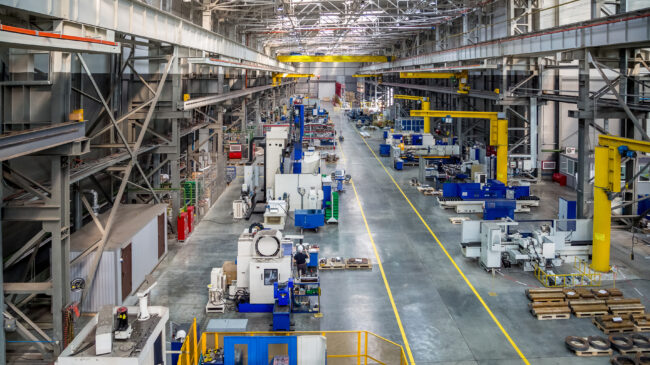As of late, our national political zeitgeist has been captured by a bipartisan desire to win the ever-elusive favor of working-class Americans. By no means is this an entirely new phenomenon, nor are the rather unsubtle policy proposals meant to endear this sought-after voting bloc. Policy initiatives like minimum wage increases and trade protections are generally well-intended, but they are also overtly political gambits that rarely take into account actual policy results for blue-collar workers.
This can leave one asking, is anyone actually looking out for the working class?
Former President Donald Trump’s surprise victory in the 2016 election has rightfully been partially credited to working-class voters in key electoral college rustbelt states. Trump’s claims that he’d “make America great again” and bring back traditional manufacturing jobs largely appealed to the cohort of workers that have felt “left behind” as the economy has transformed in recent decades. Consequently, a cadre of voices from the political right is urging Republicans to shed what was thought to be the traditional conservative economic consensus, so-called “free-market fundamentalism,” in favor of a more populist, “pro-working-class” agenda. As Republican Sen. Josh Hawley claimed on election night in 2020, “We [the Republican Party] are a working-class party now. That’s the future.”
On the other side of the political aisle, the moderate, blue-collar appeal of the newly elected “Son of Scranton,” President Joe Biden won the Democratic Party’s nomination over a field of candidates considered to be to his left, including Sen. Bernie Sanders and his vision of democratic socialism. Various parts of the Democratic Party seem to be aiming to address a perceived loss of support from the working class with differing visions. The Sanders wing of the party is distinctly more populist, much like Trump’s populism on the right, citing the political establishment’s disregard for working people. Meanwhile, President Biden’s approach uses milder rhetoric, but nonetheless promises to achieve many of the same types of things, including to “Build Back Better” by increasing the minimum wage to $15 and restoring American manufacturing jobs through “fair trade.”
Both major political parties’ interest in addressing the needs of working-class Americans is laudable, but their recently proposed policy measures aimed at doing so are not. Populists from both parties are, at least partially, in agreement on increasing the minimum wage and imposing restrictions on trade. Both of these proposals clearly benefit some workers but would also have negative consequences for other workers and consumers in general, particularly amongst the working class.
This tradeoff raises an integral concept in public choice theory: dispersed costs versus concentrated benefits, where the benefits of policy proposals are concentrated among a small yet vocal group but their costs are dispersed among the much larger constituency of consumers. The larger group of consumers may not be aware of these costs imposed on them and are therefore not easily politically mobilized. Many rational politicians have every electoral incentive to pursue policies like minimum wage increases, but good politics does not equal good policy.
Workers who would receive a wage increase if the federal minimum wage was hiked would undeniably benefit. Of course, this ignores the other workers who lose their jobs, have their hours cut, or see their non-wage benefits reduced as businesses cope with a sudden rise in labor costs.
Young and untrained workers stand to lose the most from a large increase in the minimum wage. A minimum wage hike would also harm small businesses, many of which are owned by Americans who could be considered working class. Additional costs to consumers by way of price increases that many businesses would implement to offset their higher labor costs should also not be ignored. Notably, many price increases would hit working-class consumers the hardest.
A minimum wage hike wouldn’t be all bad for business though. In fact, increasing the minimum wage would benefit many large corporations who already pay at least $15 starting wages. Take Amazon, the world’s second-largest retailer, for example. The company recently took out a full-page ad in The New York Times declaring, “It’s time to raise the federal minimum wage. Actually, it’s past time.” Amazon already increased its minimum wage to $15 per hour back in 2018, so it’s possible the company views a federal minimum wage increase as something that would help it snuff out competitors. Unintentionally helping “big tech” companies and retailers like Amazon while hurting small businesses would be markedly out-of-step with the stated goals of the populist movements on the right and left.
Then there is trade. On the whole, Americans have greatly benefited from free and open trade. Consumers pay less for imported goods produced in countries with cheaper labor and the productivity benefits that come from agglomeration. But these are widely dispersed benefits across the economy. In contrast, individual workers, who may have lost manufacturing jobs because those goods are now imported, experience the direct, concentrated costs of free trade. Taken to its logical extreme, one might draw the conclusion that worker displacement eventually outweighs the benefits of trade. As Marshall Auerback wrote for the American Compass:
Consider a thought experiment: Imagine a country with one worker and that worker was the sole consumer. The worker would understand that by consuming foreign-made goods produced [sic] a worker overseas, he would soon have no income and, consequently, no consumption.
But Auerback’s thought experiment ignores the fact that skills and resources are not equally distributed across people and countries. Presumably, our lone worker is more efficient at producing some goods than others. Importing goods produced by foreign workers frees the worker from providing for all his needs by himself. Instead, he can specialize in the areas where he is more efficient and improve his standard of living.
History shows that the exchange of goods provides the basis for civilization. Without the benefits of exchange, all of humanity would be engaged in agriculture and trapped in a state of mere subsistence. Fortunately for humanity, as economies develop and engage in trade, new industries emerge along with jobs that are higher paying and less labor-intensive.
In the short term, however, there are real costs, like some job losses that result from the expansion of trade that shouldn’t be ignored by policymakers. Unfortunately, many policymakers and populists on both sides of the political aisle point to trade restrictions such as tariffs, import quotas, and corporate tax penalties for offshoring jobs as potential remedies. These proposals merely move pieces around. Some manufacturing workers may receive the benefits of trade restrictions or tariffs, for example, but other working-class consumers pay the bill and other industries or businesses are hurt by the propping up of others.
If trade restrictions and minimum wage hikes won’t actually help the working class, what would? In part, doing the opposite. Trade restrictions and minimum wage increases are only “pro-worker” insofar as they benefit some workers at the expense of others.
With respect to worker displacement and wage growth, markets offer better solutions than government intervention. To be sure, markets are imperfect. However, compared to the available alternatives, free and voluntary exchange tends to result in better, more virtuous outcomes—including innovation and higher standards of living.
For example, disruptions from trade can be offset by the way unfettered markets facilitate the transition into new forms of employment. The oft-cited suggestion that displaced manufacturing workers should just “learn to code” is beyond parody, but that does not mean workers are incapable of changing and learning new skills.
Economic libertarians are often lampooned for what’s perceived as an overemphasis on occupational licensing reform. In reality, licensing reform is perhaps one of the most potent pro-working class policies at our disposal. Eliminating unnecessary barriers to entry into middle-income occupations could go a long way toward providing opportunities to displaced workers and expanding the middle class.
Markets also provide wage increases. In their 1979 book, Free to Choose, Milton and Rose Friedman posit the question: Who protects the worker? Their conclusion directly addresses the ability of markets to improve living standards without robbing Peter to pay Paul:
…when workers get higher wages and better working conditions through the free market, when they get raises by firms competing with one another for the best workers, by workers competing with one another for the best wages, those higher wages are at nobody’s expense. They can only come from higher productivity, greater capital investment, more widely diffused skills. The whole pie is bigger––there’s more for the worker, but there’s also more for the employer, the investor, the consumer, and even the tax collector.
In a free market system, the rising tide typically lifts all boats, and wage growth is not a zero-sum game. To characterize preference for such a system as fundamentalist misses the point. Market skeptics are correct to criticize the self-dealing, rent-seeking, and regulatory capture that permeates the political establishment. But these are examples of crony capitalism, not free markets. The crony capitalists are the rightful recipients of populist ire, who in most cases are not free-market fundamentalists, but rather swindlers.
Our political leaders must determine whether they are interested in genuinely implementing policies to help the working class or simply in securing their votes. If they want to improve the prosperity of the working class, politicians should throw out crony capitalism while embracing the ways markets and competition can serve as the most promising solutions to lift up the working class.

